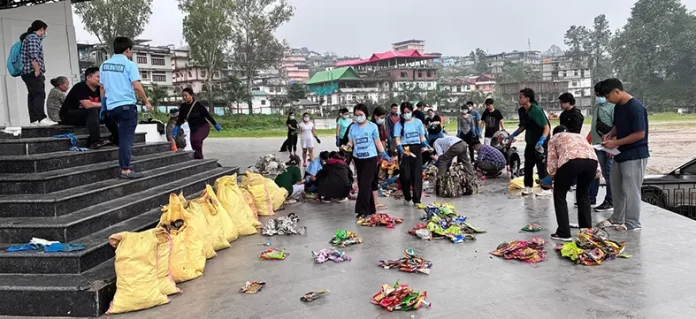[ Indu Chukhu ]
ITANAGAR, 1 Jun: As many as 53 people participated in a mass cleaning drive in and around the festival ground at IG Park here on Sunday.
Joining Himalayan states across the country under the banner of ‘Zero Waste Himalaya’, the Youth Mission for Clean River (YMCR) conducted The Himalayan Cleanup (THC), with the theme ‘Our mountains deserve better’.
Youths of all age groups, most of them women, participated in the drive. The YMCR is by now is a familiar name for at least the citizens of Itanagar, as it is widely known for cleaning up rivers and streams. Since 2024, the YMCR has adopted the Yagamso stream near IG Park. Since then, it has inspired many college and university students to take part in cleaning drives.
Sunday’s initiative under THC aimed to raise awareness about the Himalayan waste crisis and promote sustainable practices, with volunteers collecting, segregating, and auditing 4,860 waste items, identifying single-use plastic as the major polluters.
The cleaning drive revealed alarming statistics: single-use plastic bags made of low-density polyethylene topped the list of pollutants with 737 items, followed closely by 734 disposable glasses, 553 chewing gum wrappers, and 456 chocolate wrappers.
Other waste items, including beer and whisky bottles and noodles packets, were also prevalent. A total of 61 waste types were identified, amounting to 4,860 items. The data will be uploaded to a customized app called the Kobo app, to Zero Waste Himalaya to hold top polluting brands and companies accountable.
THC is a greater concept of zero waste cleanups. Zero Waste Himalaya is a conglomeration of organizations that connects with all the Himalayan regions, including Ladakh, Shimla, Nepal, Bhutan, and the Northeast.
The THC’s annual cleanup is different from any regular cleanup. It not only cleans up an area but is also responsible for auditing and segregating the plastic packaging brands that generate the largest plastic waste.
The volunteers segregated all the products and later segregated the products’ brands as well.
Jarjum Gamlin Ete, president emeritus of the All India Union of Forest Working People, addressed the volunteers, urging them to adopt sustainable lifestyle choices. “Our forests, water, and air are no longer what they used to be. Pollution, largely human-made, is the root cause. We must introspect and nurture our environment by generating less waste and disposing of it responsibly,” she said, and recalled the 80s’ era Itanagar when the rivers in the city were clean.
“It is very inspiring to find young people taking interest in environmental conservation,” she said.
She stressed on the need for the involvement of the residents in cleaning drives. “People who are generating waste also need to be put into accountability,” said Ete. She said that cleaning drives should not only be limited to people who are volunteering but also those who are producing waste.
YMCR chairman SD Loda expressed concern over Itanagar’s growing waste problem, emphasizing the need for individual responsibility. “Waste is a cancerous issue here, left untreated in our environment. We must be our own scavengers, taking charge of our waste. Mother Nature is our lifeline, and we must give back to it,” he said.
YMCR vice chairman Keyom Doni, who led the waste audit, highlighted practical solutions. “Simple actions like carrying cloth bags to markets can reduce plastic use. We thank all volunteers who braved the weather to make this cleanup a success,” he said.
YMCR general secretary and Zero Waste Himalaya member Dr Prem Taba underscored the urgency of addressing the Himalayan waste crisis. “THC shines a light on the plastic onslaught threatening our mountains. Waste management must go beyond brooms and bins – it’s a production and design flaw. Companies must be held accountable for polluting our fragile ecosystems. We call on everyone to reflect on consumption patterns, switch to sustainable alternatives, and demand action from top polluters,” Taba said.
Speaking of the YMCR’s journey, Taba informed, “When we began to rejuvenate the Yagamso river, with the support of the Itanagar Smart City Development Corporation Limited, we had a set of mission targets. Some of them are: monthly door-to-door IEC campaigns amongst riverside dwellers; art and literary competitions for schoolchildren; and monthly cleanups and plantation drives.
“Over the years, we have been successfully doing all these mission targets, but overall rejuvenation of the Yagamso river remains a matter of concern. But there’s a change in people’s mindset now, awareness is spreading,” said Taba.
Speaking about his association with river cleanups, Taba said, “Over the years, cleaning rivers and dealing with the waste crisis has turned into something like a religion for me. Every time I’m out there, it feels like therapy and healing for my soul. It has been a learning and fulfilling experience so far in the mission to clean the Yagamso and raise awareness about the waste crisis.”
Dentist Mingkiam Gao, a first-timer in the YMCR’s clean up drive, said that “there are people here in Itanagar who care to safeguard the environment and spread the word.” She said that “one step in picking up the litter that we see does really make a difference.”
The THC campaign encourages participants to ‘Reflect, Switch, and Demand’ – reflect on waste issues, adopt sustainable practices, and push for better products and policies.
As global negotiations for a plastic pollution treaty approach, THC emphasizes mountain-specific solutions, highlighting the threat plastics pose to both the environment and human health.
Sunday’s event was held in collaboration with the Itanagar Smart City Development Corporation Ltd, Abralow Memorial Multipurpose Society, Morning Glory, and the NSS unit of Don Bosco College, Itanagar.
All the participants were awarded certificates for their contributions to the cleanup drive.

